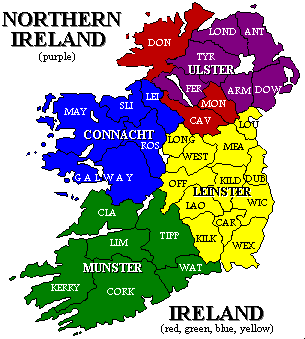

Walshfamilies.com
Home
| Reunion | Families | History | Photos
History
 Walsh is among the
five most numerous surnames in Ireland, found throughout the country. There are
concentrations of Walshes in Leinster in counties Kilkenny and Wexford, in Connacht
in counties Mayo and Galway, and in Munster in counties Cork and Waterford. Walsh
is a semi-translation of the early Irish surname Breathnach (click
for pronunciation), meaning ‘Welsh’ or ‘Breton’, later anglicised as 'Brannagh'
and 'Walsh'.
Walsh is among the
five most numerous surnames in Ireland, found throughout the country. There are
concentrations of Walshes in Leinster in counties Kilkenny and Wexford, in Connacht
in counties Mayo and Galway, and in Munster in counties Cork and Waterford. Walsh
is a semi-translation of the early Irish surname Breathnach (click
for pronunciation), meaning ‘Welsh’ or ‘Breton’, later anglicised as 'Brannagh'
and 'Walsh'.  As previously mentioned, the Walsh surname
in Ireland had its Irish roots in the Welsh and Welsh-Norman clans who
first participated in the Cambro-Norman
invasion of Ireland. As cited by J. C. Walsh (Walsh 1170-1690), "they
more than likely came from some of the leading houses of Wales." Some have placed
their relation and descendancy from Owen Gwynned, Prince of North Wales, and his
sons Ririd and David. Others see relation to some of the leaders of the Norman
invasion including Robert FitzStephen (see possible
Walsh Pedigrees), Raymond le Gros de Carew, Maurice FitzGerald, and Richard
FitzGilbert de Clare. Other possible connections include Philip FitzRhys, son
of Rhys, as well as Meyler FitzHenry. See also Descendants
of Nesta.
As previously mentioned, the Walsh surname
in Ireland had its Irish roots in the Welsh and Welsh-Norman clans who
first participated in the Cambro-Norman
invasion of Ireland. As cited by J. C. Walsh (Walsh 1170-1690), "they
more than likely came from some of the leading houses of Wales." Some have placed
their relation and descendancy from Owen Gwynned, Prince of North Wales, and his
sons Ririd and David. Others see relation to some of the leaders of the Norman
invasion including Robert FitzStephen (see possible
Walsh Pedigrees), Raymond le Gros de Carew, Maurice FitzGerald, and Richard
FitzGilbert de Clare. Other possible connections include Philip FitzRhys, son
of Rhys, as well as Meyler FitzHenry. See also Descendants
of Nesta.